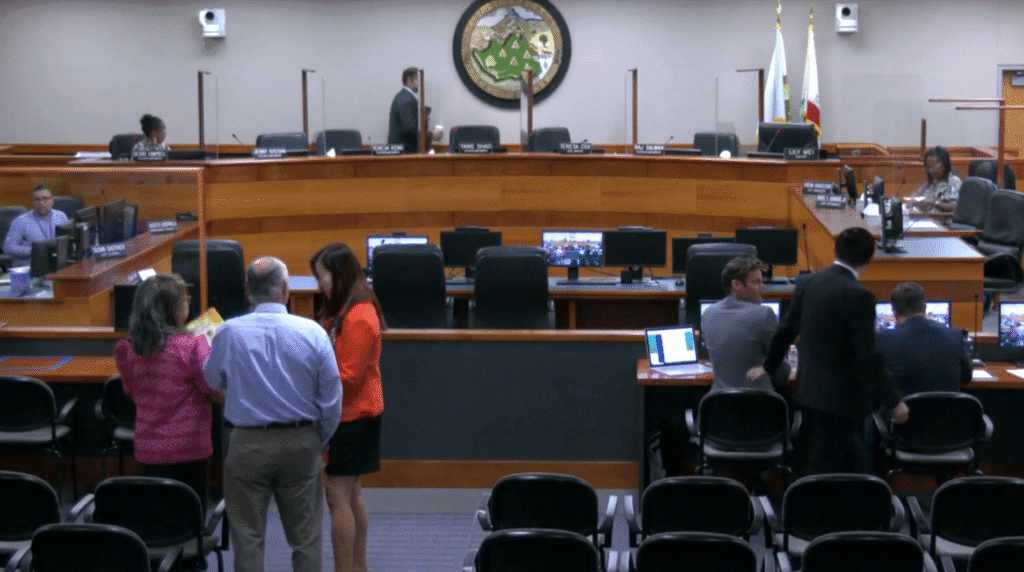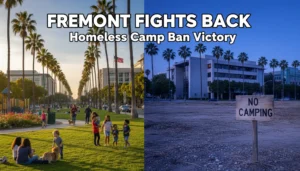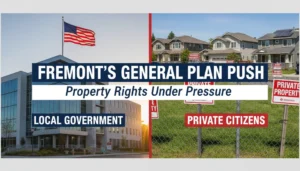City of Fremont Council Meeting | October 17, 2023

Transcript
Good evening. Welcome to the October 17 city council meeting. I’d like to call the meeting to order, and I’d like to invite Councilmember Yang Xiao to lead us in the Pledge. I pledge an allegiance to the flag of the United States of America, and to the Republic for which it stands, one nation under God, the visible, with liberty and justice for all. Thank you. Roll call, please. Thank you. Council Member Shao. I’m sorry I missed. Council member saw one.
I apologize. Present. I was ready. Council Member Shao is here. Council Member Casson. Here. Council Member Campbell. Here. Council Member Kang. Here.
Vice Mayor Cox. Here. Mayor May. Here. Thank you so much. And at this time, I’d like to share the announcements that there’s vacancies on our Boards and Commissions. And the City Clerk’s Office accepts applications for the boards and commissions throughout the year. And if you’re interested in learning more about those opportunities, please see our Boards, Commissions and Committees web page on our city’s website. Or if you have questions, feel free to dial call the City Clerk’s Office at 510-284-4060. Emails submitted to the City Clerk Office are compiled and distributed to the City Council and considered part of our City’s public records.
And if there’s any other questions, if you’re coming here today to join us, I would like to announce this meeting will go up to 11:30 p.m.. And we’ll allow for 30 minutes of general public comment. And if there are additional speakers for oral communications after the initial 30 minutes, we’ll take those at the end of the evening if time remains. And I would like to now turn this meeting over to our City Manager, Karina Shackleford, to make any announcements and introduce her staff at this time. Thank you, Mayor May. With us this evening, there is our city attorney, Rafael Alvarado. Across from me is our city clerk. Susan Gothier, and our management analyst, Alberto Quintanilla. And we also have our Sergeant at. Arms, who’s always here with us, sergeant Kenneth Quok.
Thank you. No announcements this evening. Thank you. And at this time, I’d also like to then move the Consent Calendar. And the consent calendar are items that will be passed with one council vote, and the staff recommendation will stand. Does any member of the Council wish to remove any item from the Consent calendar? Any speaker cards for any items? Thank you. Is there a motion from the Council to prove the items? Oh, thank you.
Sorry. Okay. Thank you. So I see. Vice Mayor Teresa Cox and also Councilmember Saw one. Is that a motion in a second? Yes. I would like to move that we accept the entire consent calendar and we. Have a motion and by second by Council Member Saw One. Please vote.
Thank you. And the consent calendar passes unanimously with the staff recommendation standing. And at this time, I’d like to share this evening, we have two ceremonial items. There is a proclamation for hispanic Heritage Month, which just ended a few days ago, but we would love to still celebrate it’s traditionally September 15 through October 15. And so I would love to welcome Patricia to join me. Patty. Sorry. Montenejano. So bienvenido. And I look forward to seeing you down there’s.
It longer arms. Thank you so much for coming. So again, bienvenidio. I would like to share this for Hispanic Heritage Month. Whereas Hispanic Heritage Month started as Hispanic Heritage Week under former President Lyndon B. Johnson in 1968, and was expanded by former President Ronald Reagan in 1988 to cover a 30 day period starting on September 15 and ending on October 15. And whereas Hispanic Heritage Month celebrates the histories, cultures and contributions of American citizens and residents whose ancestors came from Spain, Mexico, the Caribbean and the Central and South America. And whereas the diverse heritage of the Hispanic community has had a significant role in the economy, culture, education, all fields and identity of the United States, and made contributions to the City of Fremont’s success. And whereas the City of Fremont recognizes the many contributions and accomplishments of the Hispanic community, as well as their deep commitment to family and community, enduring work ethic, and the perseverance to succeed and contribute to society. And Whereas, the City of Fremont encourages the recognition of the rich cultural heritage and ethnic diversity within greater Tri Cities area as part of the City of Fremont’s commitment to diversity, equity, inclusion and cultural awareness programs, and Whereas, the Fremont City Council encourages all to promote and join in the appropriate celebration and observances throughout the City of Fremont.
Now, therefore, the City Council of the City of Fremont hereby declares September 15 through October 15 as Hispanic Heritage Month in appreciation of the achievements and contributions made by members of the Hispanic community to the City of Fremont. So, congratulations. And thank you, Patty, for coming to accept. Thank you. Thank you very much. Just push I just want to say thank you for everyone for having this such a great moment for me. It’s my last one. It’s my last one in person as I’m terming out as a Human Relations Commissioner. But I’m so glad to have been part of wonderful eight years of being part of such a great community. I may be off the commission, but I tend to dabble and get myself into lots of trouble here and there.
So I’m not completely gone. But thank you very much for tonight. This means a great deal to me and my family and everybody else. Thank you so much. Madam mayor, I would like to make a point of privilege that our commissioner, Patty Matago, was honored by assemblymember Alex Lee, as well as Alameda county supervisor Alyssa Marquez at the recent Hispanic heritage month celebration. And she was our honoree for this last month. So I’d just like to recognize that before our City Council that Fremont was in the House. Which is glaciers and bienvenido. We were so much appreciative of the fact that yourself and so many others have represented our community and continue to be able to celebrate this. And I hope that people will join us.
In the past, we have had in our city, besides this honoree, we also have had three Spanish immersion programs, and we’re so blessed to have that resource here in our city, as well as be able to celebrate DS de le Muertes and other holidays. And so we look forward to continuing this as well. As I know I would say soccer, but my son would correct me and tell me it’s football. Football. And so I know that with the World Cup and other things coming, there are so many opportunities, and of course, we look forward to your continued participation and that we welcome that in our community. So thank you. Muches gracias. Also this evening, I’d like to be able to honor Filipino American History Month. And so I’d like to invite our former trustee, current trustee for New Haven. Sure, I’m going to read this Magadang.
So, whereas California is proud to be home to the largest Filipino American population in the nation, that contributes greatly to shaping, advancing, and enriching our community, and nearly 100,000 Filipinos live in Alameda County, representing 6% of its total population. And whereas Filipino Americans are the third largest Asian American group in the United States and the second largest Asian American group in the state of California, and whereas the Filipino American National Historical Society recognizes the year 1763 as the date of the first permanent Filipino settlement in USA, in St. Malto, Louisiana. Malo. Yeah. Okay. Sorry my eyes are not as great as it could be. Whereas in November of 2009, the United States Congress passed its resolution to officially recognize October as Filipino American History Month. And whereas Filipino men and women have made valuable contributions to all areas of life throughout the California state and the United States, including government, business, education, arts and sciences, medicine and healthcare, law enforcement, and the military. And whereas Filipino Americans have a long history of engaging in social justice movements across the nation, including, but not limited to, the United Farm Workers Movement and the Hawaii Sugar Plantation.
And whereas the Filipino American communities have shared their rich culture and traditions with neighbors and friends, while setting examples as model citizens and public servants. Now, therefore, the City Council of the City of Fremont hereby proclaims October of 2023 as Filipino American History Month at the City of Fremont encourages all the members of the community to continually engage in efforts to learn, respect, and engage the history of the Filipino American community. And thank you for holding that wonderful event, and perhaps you can share a little bit about that. And I think this is an annual event that you’ve been doing, and so we look forward to sasalamapole. Thank you. Take a real quick picture. Okay. Thank you. See what thank you very much on behalf of the Filipino National Historical Society in the East Bay, which is Alameda and Contacasta counties. And I would like to thank you for this proclamation.
But I also would like to introduce who’s with me. This is Victoria Santos. He is one of the national Board trustees for the Northern California area. We have over 40 chapters, 43 chapters all around United States and Edith and Dennis back there. So we are here as member of funds to accept proclamation. And what Mayor May Lily May was sharing was that on October 7, we had a Filipino Historical History Month celebration at Italyong Veracruz Middle School. It was a very successful day. We had the topics of standing on your shoulders, representation matters and legacy. And we had a very good turnout of people. We have almost 500 people attendees at that event.
So we are very grateful to the community for supporting us. So again, thank you. I will not take more time. Thank you very much for this proclamation and we will share it. You will sure will see you your faces on Facebook tonight. Thank you so much. I also wanted to share that we have many different great authors locally too, and resources. And so around the corner from here is Banter Bookstore and they have one of the books from one of the authors who is local here to celebrate Filipino history. So we’re so fortunate to be able to encourage the access to these wonderful resources and programs. Next on our calendar this evening is our regularly scheduled agenda item.
Oh, actually, it’s oral communications. And at this time are there any speaker cards for oral? Currently have four. Okay, thank you. If we could announce that this is for any persons to speak on matters which are not scheduled this evening on the agenda may do so under Oral Communications section of the public Communications. And the communications received again via email are placed on file and considered part of public record. And so if there’s any agenda item that’s not scheduled this evening, the council cannot take action and nor respond to the items that are brought up under Oral Communications. But please note that we will take note of these. And however, the item could be agendized for a future meeting. If the council makes a referral to staff for a report back when speaking on behalf of an organization, please kindly state the name of the organization you are representing.
And a bell will ring when 30 seconds are remaining for you to sum up your comments. And the bell will ring again when your time has ended. And so if we could call our next speaker and we’ll go with two, three we’ll go with many minutes, three minutes. It’s only four speakers. Okay, the first speaker is Benjamin Yee, followed by Kelly Rose. Welcome. Hi. I think everybody knows who I am. Thank you. Mayor May and city Council and city staff.
I know they’re all smiling right now. I’m extremely excited about what I want to share with all of you and announce it’s, especially because we just had the proclamation for Filipino American History Month. So, the mayor and I have been working for the last couple weeks with Iglesia Nicristo, one of the largest Philippine church organizations in the United States, and I just got off the phone with them, as well as the management team with Pape Machinery. They both have worked together and agreed that on the 29th of this month, from four to 07:00 P.m., they’ll be giving away food to 100 needy families. So I just wanted to let you all know that they will be doing that on the 29th from four to 07:00 P.m.. So the name of the event, they just sent it to me, so bear with me. It’s called the Felix E. Manolo foundation. Care for humanity in honor of the birthday of a glacier. Nicristo executive Minister brother Eduardo V.
Manolo. So, just wanted to let you know, so I won’t take up all three minutes. I think I’m done. Thank you. Kelly Rose. Welcome, Kelly. Followed by John Hines. Good evening. Thanks for having me. I’m here tonight as a private citizen concerned about a homeless encampment that is on the rise on Chapel Way in Fremont at Irvington Avenue.
This encampment has doubled in the last week. There’s approximately five RVs and three cars on the northbound side of Chapel Way, and there’s three RVs and one car on the southbound side. All of these vehicles are within 166 yards of the school. They all fall way closer than that. I spoke with the principal today, Chris I can’t remember her last name, who says that she has been in communication with the homeless task force, the police department, and also superintendent Cameraack, to no avail. I also met today with Lori Flores and Officer Mandy Singh on site as they were coming out to survey the situation, based on the numerous complaints. So my concern is that it’s a public safety issue, not only to the children, but to the public. You cannot freely drive down the northbound or southbound lanes of Chapel Way because there’s a propane tank on the northbound side and there’s a generator in the street on the southbound. We complain, they move them, but also the streets are obstructed, or, excuse me, the sidewalks are obstructed. So the kids are not allowed now to be walking freely down the streets.
And personally, I wouldn’t want my eleven year old walking to Horner School on these streets because there is oftentimes feces needles, beer bottles, glasses of urine, debris, garbage, and as of Monday, yesterday, there was two pit bulls. And whether they are aggressive or not, I don’t know, but I know that there’s other cities in California, in La. They have put a ban on. They have an ordinance. I guess I want to know what Fremont’s going to be doing about this. It also is next to a cemetery. There has been considerable vandalism. They have set vans on fire, they have disrupted processions, and it just continues. And I’m hoping something can be done by Fremont to bring in an ordinance to make a ban for encampments by schools. It just doesn’t make sense that this would continue to be allowed, and just really quickly.
But the Homeless Task Force lady said that they’re doing the best they can, but they’re not. Thank you, John Hines. Hello, everyone. One of the big problems with online discourse these days is that when people can make comments anonymously, or even just remotely, they can be tempted to say things they would not say when facing a real person. And for that reason, I think these recent changes to the Zoom combating policy are mostly a good thing. There’s a different temptation that has concerned me for a few years, though, and that’s that Zoom offers tools to meeting organizers which they could use to curate, censor, or otherwise limit the speech of people that might be unflattering or inconvenient. Do I think that’s happened in these meetings here? I don’t think so. But if it had happened, it would have happened out of public view, and those of us in the audience can’t really know. That naturally lowers our confidence that these meetings are all on the up and up compared to an open meeting format like this.
That’s just one of the costs of using Zoom. The problem is not limited to Zoom, though. Last month, I was at a talk by an Alameda County official which allowed questions from the public. But the questions were routed through a moderator, who, as it turned out, was a close ally of the speaker. Now, was the moderator doing a great even handed job of choosing questions, or was he carefully curating them to benefit the speaker in the audience? We could not know. That naturally reduced our respect for the speaker. When you expose your thoughts to public criticism or even ridicule, that is a sign of strength, and over time, it can help make your thoughts stronger through the testing and challenging they get. When instead you give into the temptation to control speech, that is a sign of weakness, and over time, it makes your thoughts weaker. In these meetings here, I have thrown some pretty rough stuff at the council over the years.
To your credit, you have taken it. There was maybe one exception. But never mind that sarcasm is not nice. It can be very unpleasant to receive. But sarcasm is a perfectly legitimate tool of communication, and when you have limited time, it can be the only way to get a point across. Niceness politeness are good things. They are not substitutes for content or clarity. When somebody you know comes back from the hairdresser and asks, how does it look? And you’re thinking you might find a temporary way to get out of this jam today. But if you care, before the next trip to the stylist, you should say something, because that’s useful information, whether it’s what the person wanted to hear at the moment or not.
In these meetings here, going forward, in those moments when you feel the greatest temptation to limit someone’s speech because it’s not nice, those are the moments when you should exercise the greatest restraint, because they’re also the moments when you are most likely to be in the wrong criticisms. Dissenting speech are valuable information even when presented rudely by rude people. Thank you. The next speaker is Daniel Karpelovich. Good evening, council members and Mayor May. My name is Daniel Karplevich, and I live in the Brookville neighborhood in District Two. I come to you to bring attention to an issue I think you will agree is relevant to all residents of Fremont. That is my morning bike commute to the train station. I’m joking, of course, but it opens my eyes to a safety issue every time. I happen to be riding by American High around 08:00 A.m., the bike infrastructure is built in such a way that the overwhelming number of parents double parking in the bike lane, dropping off their kids, make it completely unsafe and unusable.
When parents see this, they don’t feel safe letting their kids ride to school and drive them. Instead, this creates even more traffic. This makes it even less safe to ride a bike or walk. If it sounds like I’m talking in circles, it is, because this is an insidious cycle that makes itself worse and worse if it is not stopped. Please ask these questions when plans and projects are brought to you for approval. Ask your staff, how will this design prevent bike infrastructure from being taken over by cars, signs, and paint? Do nothing against the overwhelming force of impatient parents who need to drop off their kids at school. Above all else, do not allow for compromises in the designs when they will put kids and the general public in danger every weekday, morning and afternoon. A road design does not need to be well designed for noon on a Saturday, and, you see, designed for 08:00 A.m. On a Wednesday.
Thank you. That was the last speaker. Thank you. I wanted to just add some upcoming events and access. While I cannot answer non agendized questions, there’s a couple of things I wanted to share. One is our city is in the process of doing an active transportation management plan, and as such, we are rotating through the districts with walks and rides as well as there’s been a survey. And so I’d like to encourage people to continue to participate in that. In fact, this weekend we had two of those in our city. And then also, I wanted to note that for the comments in general about the school and the city. The school and the city has a joint meeting a couple of times a year, three times a year.
And there’s actually one coming up on October 30, which would have normally been October 2, but is rescheduled to October 30. And so if there are people who want to address things that are of interest to the two parties, that might be a good place to express that, because we will both be there, both the Superintendent Kamek and the trustees, as well as us, as the council. And so I just wanted to thank everyone for your feedback. And also, if you haven’t had a chance to right now, we are in the process of doing a Homelessness Response Plan community survey. And so I’d ask that people provide those feedbacks. And then also in the council, while we may represent parts of the city and district, I believe that we are interested in all of the city and all the districts. And so you’re also welcome to speak with us because we will also be speaking with our consultants as we work through this process. So thank you for the outreach and for all the comments of the people who’ve come this evening. Next on our agenda item is actually our Rent Review Ordinance annual report and program fee discussion, and our CDBG Administrator Robert Lopez, will be providing an overview. And so this is a public hearing, and so I’d like to welcome Mr.
Lopez. Good evening. Good evening, Mayor May and city council members. Thank you for having me. Just quickly. The rent review. The item before you tonight is the annual Rent Review Ordinance Report for fiscal year 2022, covering July 1, 2022, to June 30, 2023. The second part is also the fiscal year 2023 fee setting recommendation of $14 per Rent review eligible unit. Both of these items are required by the Rent Review Ordinance to be brought to the City Council annually for receiving an approval. And I am here if you have any questions about the staff report or the recommendation.
Okay, thank you. First, I’ll turn it for the questions of the staff. This is clarifying questions at this time from the council members seeing none, I’m going to now open the public hearing. And so if we could open the public hearing I’m sorry, I did have one. I did have a oh, OK. I didn’t see your button, so thank you. Council Member Casson, do you have clarifying questions? Yeah, I know we don’t have the data because I did ask, but do you have a sense of what’s happening with evictions in the city of Fremont just based anecdotally on what you’ve been observing in the last year or so? Yeah, based on what we’re seeing through our housing stabilization program, the unlawful detainers that residents have been bringing to us have been coming in waves. So first we’ll get like, group of maybe five or six, then it’ll be quiet for a little while, then another group of like five or six or seven will come to us and that’s mainly because the courts are also backed up.
They don’t have enough staff or the judges to get all the unlawful detainer cases through. So that’s what we’re seeing right now. I think that’s probably going to continue. And I imagine what you’re seeing is probably just a subset of what’s out there, because not everyone who gets evicted would necessarily contact the city. Is that right? That’s true. I think a lot of folks are definitely looking for resources out there for their situation. We try our best to get the word out that we have these resources here. I know Alameda County has also done their own outreach, so yeah, we’re probably only seeing a little bit of the issue. And, you know, I read the report and it know some good information in.
I just I really just didn’t get a sense of kind of the bigger picture of sort of how are renters doing in Fremont? Do you have any other data or just anecdotal information to share on kind of the state of renters right now in Fremont? Not at this time. I think a lot, from what we’ve seen just through the Rent Review program, as far as consultations and mediations, a lot of landlords and tenants want to work together to find a solution to stay in their unit. So that’s been really good to see. So that’s really all I have from that. Okay, thank you. Next. For clarifying questions, I have Council Member Campbell. Thank you.
Thank you for this report. I’m just wondering, since the 5% went for, they couldn’t increase it more than 5%, but yet on the report, it’s showing upwards of 10%. Is that due to the pandemic, or is that just lack of awareness of the ordinance? That’s actually due to the State of California’s law on increasing rent. If they haven’t raised the rent over a number of years, then the landlord is allowed to raise the rent above 10% as long as it’s reasonable to reach market rate. The 5% threshold is really the threshold for any resident to bring a case to the Rent review, soar so that’s a mandate. So, in other words, they have the freedom of doing it, but it can be protested based on what Fremont has said should be the appropriate amount of rental increase. That is correct. And then we assist with any consultation or mediation that we can. Okay, well, it seems like you’ve been doing a really good job based on at least what we see here, that you’ve been able to mitigate the impact of high rent on renters.
So thank you for that. No problem. Thank you. Thank you. Vice Mayor Cox, clarifying questions, please. Yes. Thank you so much for providing this report. And in light of what you just mentioned about the state and the requirements are setting the rent increase, help me understand that you had one that went up by 31% over a two year lease. And if you could provide a little bit to protect privacy and all that, but just to kind of understanding, because you got the other ones a little bit on the average of five to 10%, but this one was 31%, which kind of stood out a little bit more. Yeah, that one, I think, was definitely one of our anomaly cases where the landlord hasn’t raised rents in a number of years.
So I think that I’d have to look back on that case. But I believe that was what the case was. Okay. Yeah, it kind of just stood out there a little bit as an outliner with some of the other data. But we really appreciate being able to have landlords and tenants sit at the table and work it out and not have to go through the costly court systems to arrive at a settlement. Another question I had was I see all these different rates and things like that. You were saying that it’s set by the state, and is there any exception or things that are written in the state law to allow some of these increases could be aligned with the Consumer Price Index that a lot of other agencies follow kind of along those lines? And why is this kind of different kind of rule compared to this is housing versus everything else that we kind of follow in those lines? So I’m just kind of curious. Yeah, that’s a great state.
Yeah, I don’t know why it’s different from other cities. Definitely. I’ve seen the CPI index rate before with other cities. But the state of California, there’s no exception for that one. Is there any consideration? I know you didn’t address it in your report that you were looking at the 14%, which kind of between five 8% to 10% there. But is there anything that would we be able to make some other modifications to keep it in line with the Consumer Price Index with tonight’s decision? Because I’m just trying to arrive at how did you decide on the 14 as opposed to keeping it the same at 13 or 13.5? I know you have that formula you mentioned, but based on inventory, based on this, based on that, just kind of keeping it a little bit more simpler, but just kind of what are some thoughts, and just kind of just enlighten me more. Yeah, actually, the $14 per unit in Fremont is one of the lowest rent review fees in the state of California, and ours is solely based on cost recovery.
So that includes staffing, program operations such as our mediators, our contract with Project Sentinel to do a lot of our tenant landlord work. So it’s complete cost recovery. So we run a very efficient program, and that’s why we’re able to keep the cost so low. Okay, thank you. Thank you very much. Thank you. And at this time, I want to open the public hearing. And are there any speaker cards? Just one, john. Hines.
Welcome, Mr. Hines. Before that next trip to the stylist, or before next year when this issue comes up again, I suggest a complete bottom up review of the whole program. I think there’s one part worth keeping, and the rest probably should be scrapped too late this time around. The part worth keeping is the longer notification period for rent increases. I think the city staff report said it’s 60 days for us. California had 30 and 90, depending on how big it was. I don’t think that’s particularly burdensome on landlords. Certainly in comparison to having to provide written justifications for an increase or having to attend mediation, and especially if a tenant has been in the same unit for some arbitrary time period, like three years or five years. It’s obviously a long term economic relationship.
One more month isn’t going to be that burdensome on the landlord. Aside from that, though, the rest could be scrapped. If you look at the staff report and see the measures of progress so much of it takes, the form this percent increase was reduced to this percent, this percent was reduced to this percent. Clearly, the city sees it as its mission here to step in in a private economic transaction and favor one side in private negotiations. I don’t know when that became appropriate. It might well make the city vulnerable to some problems in the future. And just to provide some background against which to compare that, why don’t we put staff members at the exits of Washington Hospital to help patients negotiate their bills on the way out? Those are huge. Nobody knows what the prices are until a month or two later. Or help people negotiate their bills with dentists, or have employees hover at the checkout line at Rayleigh’s to help shoppers talk their grocery bills down.
Why shouldn’t supermarkets have to provide written justification for raising the price of eggs 5%? I hope nobody takes me up on that. Grocery prices are outside the knowledge domain of the city. The city doesn’t have any value to add there, just like it doesn’t have any value to add on hospital pricing. Just like it doesn’t have any value to add on rental pricing. The market may not be perfect, but we’re not going to do any better. All we’ve done here is say we took it down some. Let’s call that a victory. If we wanted to reduce the supply of rental housing in Fremont, if that was our goal, this would be one way to do it. But we have other policies to increase the supply of rental housing in Fremont.
So we have mutually destructive goals. Basically, we burn up energy and accomplish nothing with it. So, please take a fresh look at this whole thing. Keep some simple parts that have a realistic chance of helping, and the competing policies. Let’s simplify and get rid of that stuff. Thank you. That was the last speaker. Thank you, ma’am. So that was our last speaker, and at this time, I’m going to close the public hearing and I’ll turn it back over to the council for comments. I’ll begin with Council Member Cassin.
All right, we have very expensive housing in Fremont. I was shocked when I saw the average rent of 25, nine for a one bedroom. I did some math, and that’s affordable to someone who makes 120,000 a year, which is quite high. And I do want to make sure everyone understands this process is completely voluntary. We’re not forcing anyone to lower the rent. It’s a mediation process. And I’m glad to see that there are some success stories, but I think we have a much bigger problem than what is being addressed by this mediation process, which is that the rent is too d*** high. So, I’m concerned that we don’t have data on renters in Fremont, and I’m also concerned that the council voted six to one against even looking into exploring the possibilities of additional protections for renters. If we care about preventing homelessness, if we care about having a city that’s livable for people of many different levels of income, which ultimately is best for all, because it allows us to have people living here that can do a lot of the different jobs that we need filled without them having to commute from really far away. So I really wish that the council would reconsider the decision not to even let staff do a little bit of analysis of possible rent protections, renter protections that could be good things to consider in our city.
And also I just also really wish that we could get more data on renters in Fremont and their situations. Thank you. Thank you. Next is Council Member Kang. Thank you, Mayor, and thank you very much for the annual report. So, while City of Fremont doesn’t have a strict rent control program, we want to see the rights of both landlords and tenants being protected. And I think our Rent Review Board has again been shown that with last year’s reporting, it has helped resolve more than half of the request for mediation. And as you can see in the report, some with pretty significant reduced rent increases. So I’m happy to support the continuation of the program and the new fee schedule. Thank you.
Thank you. Next is Council Member Shao. Thank you, Madam Mayor. From my experience at the Housing Authority of county of Alameda, we look at the rents in all the cities under our jurisdiction. And at least from my personal experience, I don’t see that there’s a significant increase or difference of rents in Fremont comparing with neighboring cities. As you all know, the rent as part of the real estate market, location, location, location is the factor. And even by saying that there’s not much difference between the rents here and the neighboring cities, we still consider over here, people tend to enjoy low crime rate, good public schools, as well as a community that’s so diverse that especially those who just came to the country feel very welcome to live in such a good neighborhood. Needless to say that in terms of park facilities and all the other facilities, we are proud to provide much better services to our residents. So I’m very glad to see that. Year after year, we look at the performance of the Rent Review Board, and I find that the active role it plays in keeping the happy relationship between the renters and the landlords is key to the result that Fremont is still the happiest city in the United States.
And I want to keep it that way. I don’t see rent control is a way because I’ve seen so many cases where statistical data show that once a city applies such a rent control restriction, then the local housing industry or the building rate and all the other would suffer and drop, and it’s a hit to the local economy. Also considering that in Fremont, we’re not talking about majority of the landlords being the super rich and dirty so called companies that would just suck on the blood of the renters. More cases are the mom and pop landlords who rely on the rental income for their livelihood, and needless to say that their livelihood was heavily and adversely impacted during the pandemic by the moratorium. And there are still a lot of cases where the renters, some renters, are taking advantage of the moratorium. And so the landlord is still struggling in the legal system, in those unlawful detainers to try to protect their rights. So I’m glad that this current system works. This current system pays attention to both sides, and this current system actually continues to work for the community. So with that, I comment on the hard work of the staff and also see that we’ll continue to only charge the fees to landlords who have five or more units, those commercial companies, while still protecting the rights of the I said mom and pop landlords. So I believe in the data.
And the data shows that the system works. If it works, why fix it? So that is my evaluation, and I support their staff’s recommendation to increase the fee by one dollars. And I look forward to your hard work in the future to continue to keep the happy relationship between the renters and landlords. Thank you. Thank you. Council member saw one. Thank you, Madam Mayor. And thank you. Robert, right?
Yes. I’m sorry, I forgot your last name. Lopez. Lopez, yes. I appreciate your comments and also the report. So what is the action before us? What are you seeking to the recommendation? So the recommendation is to increase the Rent Review Ordinance fee from thirteen dollars to fourteen dollars a unit. Okay. And that’s for a complete cost recovery of the Rent Review Ordinance program.
And that’s an action we need to take every year. That’s correct. Even if we didn’t change the fee, we would have to come back and say we want to keep the fee the same for that same year. Thank you. Well, yeah, it sounds like you guys are doing a good job, and for the most part, everything’s working out well, so yeah, I support increasing the fee. Okay. You’re making the motion? Sure, I’ll make the motion. Motion by Council Member Sawwin and seconded by Vice Mayor Cox and through the mayor. Yes, I know you need to read.
The no ordinance, but just to be. Clear that the action involves not only. The authority to increase the fee to $14 per unit, but also to adopt a resolution. Yes, the resolution, too. Yeah. Thank you. Move the staff recommendation. Thank you. So we have a motion and a second by Vice Mayor Cox. Could you please vote?
Thank you. So the motion passes unanimously from the council. Thank you. Soar I just wanted to say that’s. What I’m trying to show you, and at this time, I’d like to have any report outs on committee assignments from our council members. Okay. Seeing none at this time, I’d like to pause and close in a moment of silence just for the tremendous loss of lives these last weeks. Amen. Thank you. I’d like to just say that as a mother and as a community members, I think we have seen some of the horrific loss of lives in these last few weeks, and that as a community which has celebrated such diversity of heritages, faiths, and ethnic backgrounds, as well as socioeconomic, we would then pray for peace.
Thank you. And the meeting is adjourned. Thank you. Thank you. It.













